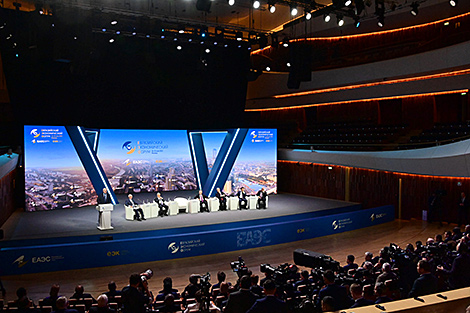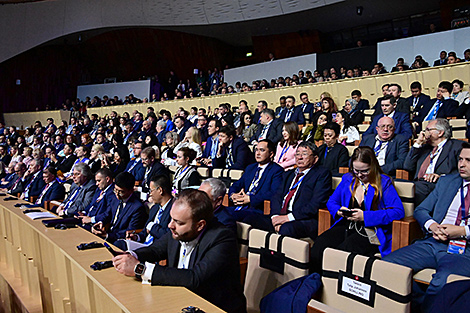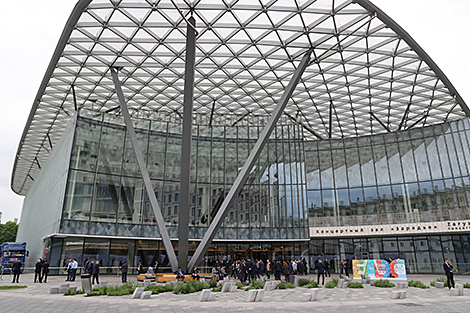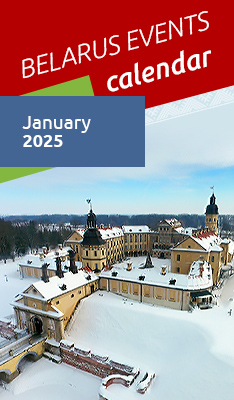News & Events in Belarus
‘We cannot and shouldn't fall behind!' Details of Lukashenko's speech at Eurasian forum

MOSCOW, 24 May (BelTA) – Belarus President Aleksandr Lukashenko took part in the plenary session of the 2nd Eurasian Economic Forum in Moscow on 24 May. This event has already become a traditional one on the Eurasian integration calendar and is timed to a regular session of the Supreme Eurasian Economic Council, BelTA has learned.
The motto of this year's forum is “Eurasian integration in a multipolar world”. Its goal is to improve manufacturing cooperation ties in Eurasian space. The business part focuses on the most pressing issues concerning integration processes in the Eurasian Economic Union. Attending the event are more than 2,700 representatives of government agencies, the business community, international organizations and mass media, including hundreds of foreign representatives from more than 50 countries.
In his speech the president presented Belarus' stance and priorities on key matters of cooperation. Aleksandr Lukashenko's speech was programmatic to a large degree not only on the regional scale but the global one as well. For instance, Aleksandr Lukashenko drew attention to the Eurasian Economic Union's international positioning. He spoke about pooling integration efforts of the Eurasian Economic Union, the Shanghai Cooperation Organization, and BRICS. He underlined Russia's role in the development of these processes.
The Belarus president touched upon such areas as industrial security and technological security, energy security and information security in the EAEU space. Aleksandr Lukashenko described food industry and efforts to ensure food security as the foundation that underpins everything. Matters of ecology and the realization of national strategies of sustainable development were also mentioned.
“We advance integration not for the sake of some confrontation. President Putin often talks about it. We would like to create multipolar equal and safe space for life activities. If we don't do it, we will trail along at the back. And they will constantly wipe their feet off us. It is our common goal and we are ready to work hard to reach it as soon as possible.”
Aleksandr Lukashenko underlined that time is the most important thing today. “Time is slipping away. Slipping away fast. We must not lag behind and we shouldn't fall behind. And our Eurasian Economic Union can play a major role in it because it has colossal perspectives. I'd say these perspectives are as great as those of the Shanghai Cooperation Organization or BRICS individually. This is why a lot needs to be done. We are moving in the right direction. Patience and time. And speed,” he said.
EAEU RECIPE IN PUTIN'S KITCHEN
Before the Belarusian head of state started his speech the moderator of the plenary session Aleksandr Shokhin remarked that Aleksandr Lukashenko is a patriarch of integration processes in the post-Soviet space as much as the first Kazakhstan president Nursultan Nazarbayev. The Belarus president had overseen many integration processes and had spoken in favor of preserving economic ties between countries.
Aleksandr Lukashenko said: “Sincerely speaking, as an experienced man I was present at the origins of many processes. I should tell you that our Eurasianism and the current Eurasian Economic Union originated as a kitchen table discussion at President Putin's. It was truly like that. He is present here and can confirm it. And the concept was a good one then. Ukraine was with us back then – [a former Ukraine president] Leonid Danilovich Kuchma.”
“Although I told my colleague that it was unlikely something would come out of it because of the situation that had started evolving in the post-Soviet space and in our region back then. Nevertheless, together with Ukraine we worked out as many as 28 documents, I think. But later on Ukraine stepped away from this process as I'd anticipated,” Aleksandr Lukashenko remarked.
Aleksandr Lukashenko credited Nursultan Nazarbayev with keeping his colleagues within limits of an economic union despite attempts of the parties, particularly Russia, to add some political component or even a bit of a military political component to the union. “But since decisions have always been made via a consensus, we've arrived at where we are today,” the Belarusian head of state said.
SAFETY IN NUMBERS
It is virtually impossible to achieve economic stability on one's own.
“The world has been recently living in a constant state of tension and uncertainty. This is also natural in the period of transition from the old era to the new one, to which we aspire and which name is multipolarity. Financial, pandemic, geopolitical crises are replacing each other so quickly that people simply do not have time to take a breath and lose confidence in the future,” the head of state noted.
He stressed that a stable economy is always a powerful anchor amid extraordinary conditions. But today the economic borders of any state are so transparent and trade relations are so intertwined that it is practically an impossible task for any state to achieve economic stability on its own.
Therefore, any country is interested in joining powerful regional and international associations such as the EAEU, SCO, BRICS, and ASEAN.
INTEGRATION OF INTEGRATIONS
Belarus is in favor of pooling integration efforts in the EAEU-SCO-BRICS format. The president stressed that Belarus has always been at the forefront of integration processes since the country gained independence. One of the priorities for the country and the entire EAEU is to strengthen regional and transcontinental alliances.
“These are new centers of power in the emerging multipolar world. They are willing to defend their interests and their own ways of development,” Aleksandr Lukashenko remarked. “The center of the world economy is irreversibly shifting towards developing countries. This is natural. Development will be secured primarily over there. Those are countries of Asia, Africa, Latin America, and the Middle East. These states no longer want to be sources of raw materials or cheap labor. They want, and deservedly so, to fully participate in the international division of labor. They seek decent pay for their work. Everyone understands this. Russia, probably, was the first to understand this. It started active contacts with African countries. We are also trying to cooperate with them. Everyone has rushed to Africa.”
The head of state drew attention to the way the West and the United States had reacted to Russia's movement. “The Russian Ministry of Foreign Affairs and others involved in politics know how the United States is trying to slow down this process and not to let Russia into Africa. But you also understand well and know that China is already there. A fight for these countries is in progress. They are the future pole of development. But this does not mean that we will not develop,” he noted.
“In our opinion, the aligning of integration efforts in the format of our Eurasian union, the SCO and BRICS will contribute towards the emergence of the largest coalition of states if we act promptly, if we don't drop the ball as people say,” Aleksandr Lukashenko stated.
The president noted that BRICS has received many applications from countries wishing to join this association. The same is true for the Shanghai Cooperation Organization.
Aleksandr Lukashenko is convinced it is necessary to more actively advance integration processes, to prevent a slowdown in the bureaucratic guts of the apparatuses of these organizations: “The current moment forces us to run instead of walking. Frankly speaking, we need to select those that match our standards faster. And then when the BRICS gains momentum, when the SCO gains momentum...”
The head of state also drew attention to the huge potential the countries belonging to these associations have accumulated in terms of economy and in terms of population. “If these organizations acted faster, the United Nations Organization would follow a completely different policy. We criticize the UN increasingly often. But, unfortunately, we have nothing to replace the UN with today. You can criticize it, but there is no replacement. We need to go faster not for the sake of replacement, but in order to see what will happen next. It is not so much Belarus that needs to act fast, but they – large BRICS and SCO states. If we miss the time, we will never make up for it. Whoever runs faster now will be in the lead for decades to come. Therefore we need to pool integration efforts," Aleksandr Lukashenko said.






RUSSIAN ENGINE
“Russia should keep its spirits high in the current situation. It is Russia that can become a very strong locomotive both in the SCO and BRICS and give momentum to the development of these organizations. And perhaps to their unification in the future, something that the progressive humanity dreams of,” the Belarusian leader said.
“Russia should be very active. Its authority is enormous despite the fact that the West smears Russia in all mass media. Russia has dared challenge the unipolar world and is leading the charge. Well, we are there for them,” Aleksandr Lukashenko stressed.
In this situation the president once again called for active action in the most peaceful and constructive sense.
Returning to the proposed thesis about the need to pool integration efforts in the EAEU-SCO-BRICS format, Aleksandr Lukashenko stressed that this would be a union of countries united by the desire for economic and political stability and for new international security architecture. “Moreover, a number of CIS and EAEU states simultaneously belong to the SCO and BRICS, which lays a solid foundation for successful advance towards the goal that we would like to see,” the Belarusian leader noted.
Aleksandr Lukashenko stated that in order to develop full-scale relations of the EAEU with priority regional associations and friendly third countries, it is necessary to take several important steps towards each other: “We need to finally overcome national egoism, as we often say. We need to learn to compromise, reach agreements on gradual liberalization of mutual trade terms, remove barriers, switch to settlements in national currencies, and expand free trade zones.”
The president is confident that all of the above will be only half-measures without the creation of the more powerful BRICS and SCO, without the development of the EAEU, and possibly without their unification in one form or another.
INDUSTRIAL REVOLUTION
According to the Belarusian leader, manufacturing cooperation will allow creating products under a Eurasian brand with the maximum rate of localization. It will also allow launching new import-substituting projects.
Aleksandr Lukashenko said: “More than a quarter of the industrial goods the union imports to the tune of about $70 billion per year can be substituted with products made by national manufacturers. A huge chunk. I hope to god we can take it. The fourth industrial revolution will give a chance for effective realization of import-substituting initiatives in the real sector of the economy at the regional level.”
“Technological sovereignty and the substitution of critical imports will remain the foundation for future development of our union regardless of how our relations with so-called Western partners change down the road,” the president stated.
He also recounted the areas that Belarus will prioritize. Those are the development of manufacturing of high-precision equipment on the basis of modern microprocessors, electronic components and software, the realization of joint projects to make electronic and optic products, paying more attention to technologies for making microchips, integrated circuits, to technologies for driverless control, automation and robotization of processing industry.
Aleksandr Lukashenko pointed out that Belarus is working on it together with the Russian Federation and has accomplished a lot in this field. For instance, in the area of microelectronics. “They have been trying to bend us for three years [with sanctions]. It is okay. It means that we can do something. And we are already doing it,” he remarked.
Belarus' priority development areas also include the production of electromechanical systems, including the development of technologies for making modern mechatronic and electromechanical components of robot technology systems, CNC equipment, and lithium-ion batteries.
The head of state emphasized that the small country of Belarus can make it all primarily because “we stand on shoulders of what was created in the Soviet Union.” Because Belarus was developed specifically as a high-tech republic. And Belarus has managed to preserve it despite all the difficulties.
At the same time Aleksandr Lukashenko stated that the country is lagging behind in a number of areas of technological development but as a whole, Belarus has everything it needs. “This is why don't wail that we are lagging behind in some areas. We have to run. We have to catch up and create. The president of Russia and I have sketched out such a policy using microelectronics and what I've mentioned about our manufacturing sector as an example. But we have to trust each other. We have to stand together, stand closer. The Eurasian Economic Union has been created for this purpose,” he stressed.
ENERGY SECURITY
It is necessary to enable non-discriminatory approaches to pricing the services of natural monopolies in the Eurasian Economic Union. Belarus President Aleksandr Lukashenko made the statement in his speech.
Aleksandr Lukashenko said: “The advancement and deepening of integration interaction in energy industry, the strengthening of positions of the Eurasian Economic Union in the context of global security remain an important priority. I am convinced that our economies cannot operate effectively unless commercial entities enjoy equal access to energy resources and the infrastructure for transporting these resources.”
“We have to ensure the realization of non-discriminatory approaches to pricing the services of natural monopolies across the entire breadth of the Eurasian Economic Union no matter what,” the president stressed.
DIGITAL AGENDA
Aleksandr Lukashenko said: “The union's digital agenda needs to be substantially updated. First of all, it applies to the integrated information system of the Eurasian Economic Union. It enables collaborative work of state information resources and systems of states of our union. We should be the ones to create it and control it without outsourcing it to Americans or Western Europeans like we did before. We have well-trained personnel and the physical infrastructure.”
In his words, it is necessary to start developing a Eurasian agenda in the area of information security.
Aleksandr Lukashenko also remarked that the Eurasian Economic Union Treaty does not regulate matters of information policy for now and this shortcoming needs to be addressed.
THE CORNERSTONE
In his speech during the 2nd Eurasian Economic Forum in Moscow Belarus President Aleksandr Lukashenko recounted the food security tasks that the Eurasian Economic Union needs to accomplish. The head of state described the matter as the cornerstone.
“The Eurasian region has unique opportunities to increase food production and export. We manage to maintain free turnover of products and avoid imposing restrictions on mutual supplies of socially important goods. The level of self-sufficiency for most products (in the union) is 80-95% today. In terms of cereals it is 132%, oil-bearing crops - 151%. Surpluses sell well on foreign markets. The demand for food is enormous. And it is growing,” the head of state said.
At the same time, a number of tasks need to be addressed in this area. It is necessary to compile a list of critical imports for the food market of the EAEU member states by means of using their own existing manufacturing facilities, their expansion and the creation of new ones.
Another task is to approximate the measures of state support for agriculture and the legal framework for its provision taking into account national interests of the participating countries.
Aleksandr Lukashenko also called for fast digitalization of manufacturing processes in crop farming and livestock production.
GREEN TECHNOLOGIES
“The so-called green agenda is actively used by the West as a tool to put pressure on our countries and restrain our economic development. The current emission standards Euro-5, 6 and all the consequent ones have nothing to do with environmental protection,” the head of state pointed out.
According to the president, unlike the European Union, the national strategies for sustainable ("green") development adopted in the EAEU countries do not limit anyone. They imply, first of all, the modernization of economies, the creation of high-tech joint ventures, a thrifty attitude to resources, proper waste management, improving the environmental culture of people and responsibility of businesses. “We believe that we should forge ahead in this vein,” Aleksandr Lukashenko is convinced.







 print version
print version make home page
make home page add to bookmarks
add to bookmarks

